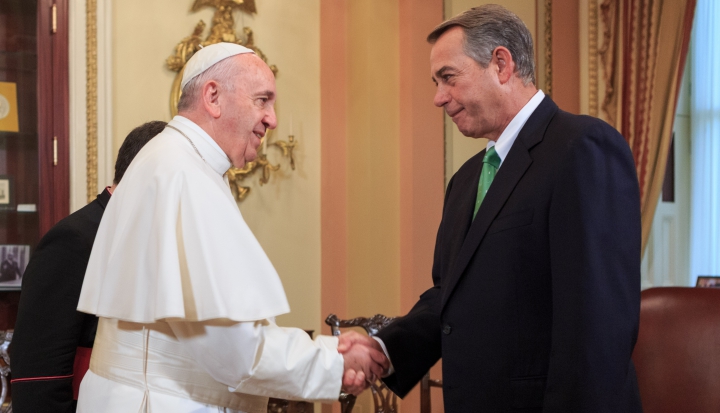There is a small Byzantine chapel in the basement of the library at Yale Divinity School. Named after Henri Nouwen, the visual focus of the tiny, round room is the triptych hanging on the wall, which depicts the risen Christ and his followers. The difference between this painting and other paintings with similar subjects? This Christ is Native American and his followers are not Mary and the disciples, but figures like Nouwen, Martin Luther King, Mother Teresa, and Thomas Merton. The painting reminds us that saints come in unexpected guises; they are not all centuries-gone, but people living and working among us today. When we understand our faith, it is just as likely to be through the lens of these people’s lived faith as through the stories of the saints that we have grown up with.
Posted by Yale Divinity Library on Wednesday, December 12, 2012
In Pope Francis’ remarks before Congress this morning, he made a similar connection. With a nod to Moses as the first lawgiver, he focused his speech on four figures: Abraham Lincoln, Martin Luther King Jr., Dorothy Day, and Thomas Merton. Four Americans, who worked for justice, dialogue, and the rights of the oppressed.
“A nation can be considered great when it defends liberty as Lincoln did; when it fosters a culture which enables people to ‘dream’ of full rights for all their brothers and sisters, as Martin Luther King sought to do; when it strives for justice and the cause of the oppressed, as Dorothy Day did by her tireless work, the fruit of a faith which becomes dialogue and sows peace in the contemplative style of Thomas Merton,” the pope proclaimed.
By placing his remarks in this framework of American “saints,” Pope Francis situated his remarks and his call of cooperation in the pursuit of justice as quintessentially American. No matter the issue—immigration, ending the death penalty, preserving the dignity of families, ending the arms race, or climate change—everything came back to the ideals of freedom, hard work, and solidarity. The American Dream, in other words.
“I would like…to dialogue with the many thousands of men and women who strive each day to do an honest day’s work, to bring home their daily bread, to save money and—one step at a time—to build a better life for their families,” the pope said. He pointed out that most of our families came from other nations at one point or another, and that although some of us were greeted with turbulence and violence, we were able to carve out a niche for ourselves and succeed in this country of opportunity and freedom for all. Thus, Pope Francis argued, we must be willing to give others the same chances that our families were given. “If we want security, let us give security; if we want life, let us give life; if we want opportunities, let us provide opportunities. The yardstick we use for others will be the yardstick which time will use for us.”
This is the American Dream—the dream that thousands and millions of immigrants and refugees are still pursuing. But it is not enough to dream; action to fulfill these dreams is necessary. “I am happy that America continues to be, for many, a land of ‘dreams,’” the pope said, “Dreams which lead to action, to participation, to commitment. Dreams which awaken what is deepest and truest in the life of a people.”
It is not enough to wish the world was different. It is not enough to pass off the possibility of change because the world is too polarized, or because people can’t agree on every single issue. We must find a way to work together, with people from different religious beliefs, different cultural backgrounds, and different political convictions. To end the polarization, the belief that we are right about everything (which means someone else must be wrong). To break people up into good and evil, righteous and sinners.
“Building a future of freedom requires love of the common good and cooperation in a spirit of subsidiarity and solidarity,” Pope Francis said. He showed us that this is not only the right thing to do—the Christian thing to do. It is also the American thing to do. If we seek to position ourselves as the inheritors of the American ideals that people like Martin Luther King and Abraham Lincoln fought and died for, these are the actions we must take.
Image: Flickr cc via Speaker John Boehner













